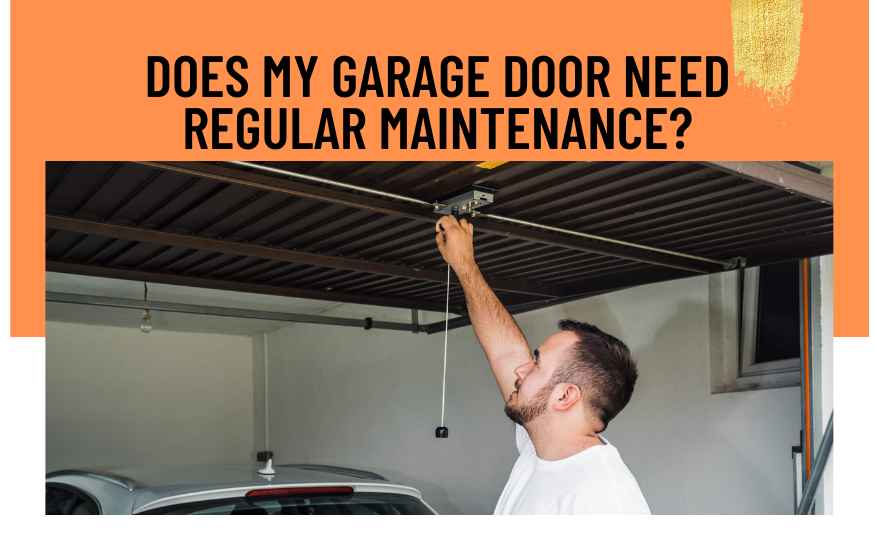Have you ever dealt with a garage door that just wouldn’t open when you were running late? Regular maintenance might be the key to avoiding such situations. Maintaining your garage door is essential for ensuring its longevity and reliability. In this article, we will delve into the signs that indicate your garage door needs maintenance, how to maintain it, and how often it should be serviced. To ensure the accuracy of our guide, we’ve consulted with experts from Winnipeg Garage Door Repairs, who provided valuable insights based on their extensive experience. Let’s dive into the details!

Identifying potential problems early on is key to ensuring your garage door continues to function optimally. Below, we outline several signs that your garage door might require maintenance.
One of the most apparent signs that your garage door requires maintenance is an issue with the opening system. If you notice that:
it’s time for a check-up. These symptoms often stem from motor strain or electrical problems within the opener system. Regular checks can help identify these issues, and timely action can rectify them before they escalate into more significant, costly problems.
Garage doors operate on tracks, which over time can become a magnet for dust, dirt, and other debris. This accumulation can obstruct the smooth movement of your door, causing it to behave erratically. If you observe:
it could point towards debris build-up in the tracks or on the sensors. Regular cleaning can help keep this issue at bay.
Pay attention to what you hear. Grinding, squeaking, or other unusual noises during door operation should not be ignored as they are clear signs that your garage door needs attention. These sounds can indicate parts that need lubrication or are wearing out and require replacement.
Rust is an enemy of metal and poses a significant threat to your garage door’s operation and structural integrity. It’s imperative to regularly inspect for rust, particularly in:
Regular inspection will help maintain the condition of these critical components and extend the lifespan of your garage door.
By being mindful of these indicators, you can ensure that your garage door remains in top condition and serves you reliably for many years to come.
Also Read: What Features Are Available When Building a Garage?
Maintaining a garage door is essential for its longevity, as well as your safety and convenience. This process involves several steps designed to ensure efficient operation and prevent potential issues.
The first step in garage door maintenance is regular cleaning, particularly of the tracks. Over time, dust, dirt, and debris can accumulate, hindering the smooth movement of the door. Use a mild detergent and a soft brush to gently clean the tracks, then rinse with water and let them dry completely.
Pro Tip: Avoid using harsh chemicals that could damage the metal tracks.
Next up is lubrication. The moving parts of your garage door – such as the rollers, hinges, and springs – need regular lubrication to reduce friction and ensure smooth operation. Use a high-quality silicone or lithium spray lubricant for this task.
Note: Make sure not to over-lubricate as this can attract dirt.
Regularly inspect your garage door for signs of wear and tear. Look for:
If you notice any of these issues, it’s best to call in a professional for repair or replacement.
Lastly, check that the door is balanced — an unbalanced door can strain the opener — and make sure that the auto-reverse feature is functional. For testing balance,
To test the auto-reverse feature,
By routinely following these maintenance practices, you can ensure your garage door continues to function optimally and safely.
The need for garage door servicing can be influenced by various factors. While it’s recommended to have annual servicing to maintain your garage door in the best condition, several other elements might necessitate more frequent check-ups.
The frequency of your garage door usage plays a significant role in determining how often it should be serviced. If you use your garage door multiple times a day, the increased wear and tear may require more regular maintenance checks.
Environmental conditions can also influence the frequency of servicing. Exposure to harsh weather or climatic conditions may accelerate the wear and tear process on your garage door components, necessitating more frequent servicing.
Consider these factors:
By understanding these factors and how they impact your garage door’s condition, you’ll be able to better determine the optimal service frequency for your needs. Remember, regular maintenance helps prolong the lifespan of your garage door while ensuring safety and smooth operation at all times.
Regular maintenance of your garage door is not just about preventing inconveniences but also about ensuring safety and extending the life of the door. By recognizing the signs of needed maintenance, performing regular checks and clean-ups, and scheduling professional servicing, you can maintain the functionality and safety of your garage door. Don’t wait for the door to fail; a proactive approach to maintenance can save time and money in the long run.
Yes, maintaining a garage door is essential for its longevity and proper functioning.
Signs that a garage door needs maintenance include unusual noises, debris build-up, rusty parts, and issues with the opening system.
To maintain a garage door, it’s important to regularly clean it, lubricate moving parts, check for wear and tear, and ensure balance and safety features are in place.
Common issues that indicate the need for garage door maintenance include difficulty opening or closing, unusual noises during operation, debris build-up on tracks, rusty parts, and signs of wear and tear.
The frequency of garage door servicing can be influenced by factors such as usage frequency and environmental conditions. Regular inspection and maintenance are recommended to ensure the door functions properly.
Environmental factors such as extreme temperatures, high humidity, or exposure to corrosive substances can influence the frequency of garage door servicing. It’s important to consider these factors when determining the maintenance schedule for your garage door.